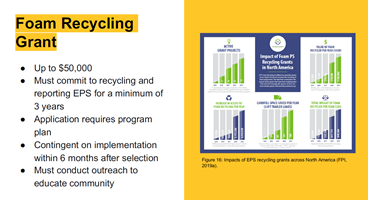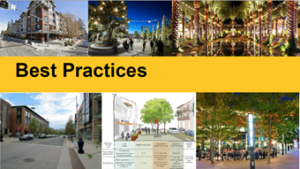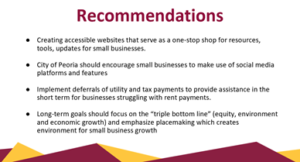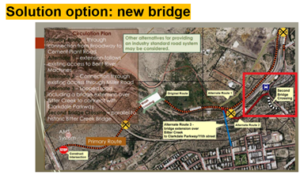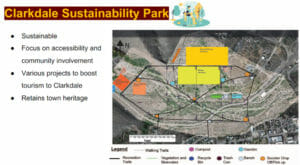On December 2, 2020, ASU Project Cities hosted our 7th biannual Student Showcase for the Fall 2020 semester. The event included video slideshow presentations from each student project group as well as Q&A sessions for more in-depth conversations about student’s recommendations for city leadership. The projects spanned a variety of topics, ranging from waste management and communicating during the pandemic, to developing smart towns, and sustainable parks. This transdisciplinary group of students had undergraduates, graduates, or individual capstone students from different backgrounds and educational interests.
This semester, the program supported 12 new projects and 240 students participated. Students partnered with two communities: the City of Peoria and the Town of Clarkdale. A video recording of the event is available on our Youtube channel.
Projects with the City of Peoria
Sustainability planning outreach with Shirley-Ann Behravesh and Stephanie Pfirman’s course EMS 589: Master of Sustainability Leadership capstone prep. Over the course of fall semester, these four graduate students from the School of Sustainability have been working with Peoria staff to develop an outreach campaign for public comment, which will be implemented in spring 2020.
Sustainable waste management with Al Brown’s class ERM 432/532: Sustainable solid waste management with the Ira A. Fulton Schools of Engineering. A mix of ten undergraduate and graduate students examined cases of other communities that have successfully implemented textile and extruded polystyrene recycling programs and explored the reuse market for these materials in the Arizona region. Some of the waste diversion challenges discussed included the difficulty of transporting waste efficiently, decreasing contamination, and making a profit (or at least breaking even) with a viable business model.
Urban forestry program development with Paul Prosser and Caroline Harrison’s course SOS 582: Project Management for Sustainability with the School of Sustainability. In this 2-semester project, two graduate students are working with Peoria staff to enhance the City’s shade master planning efforts through the development of new urban-community forestry programming.
P83 urban village visioning with Meagan Ehlenz and David King’s PUP 593: Applied project course. For this graduate student capstone project with the School of Geographical Sciences and Urban Planning, the student conducted a visioning study on the P83 district, applying an “urban village” concept. These suggestions could help ensure P83’s status as an economic, social, and cultural center in Central Arizona. The suggested best practices included a uniform urban code to establish connectivity and walkability, as well as encouraging open space when redeveloping abandoned parcels.
Covid-19: Community needs assessment with Gregory Broberg’s course JUS 385: Justice and everyday life offered by the School of Social Transformation. 95 undergraduate students examined the experience of Peoria residents and the local community organizations that have supported them through the pandemic. They found that some of the challenges that affect vulnerable communities (the homeless and retired individuals) include inaccessibility to affordable housing and food security issues. Students report back on a series of focus groups they conducted to help identify what groups need the most attention and how they can best be served.
Covid-19: Messaging Review project was headed by Majia Nadesan through her course COM 415: Risk Communication in the School of Social and Behavioral Sciences. The students examined samples of Peoria’s Covid-19-related communications for best practices and to provide recommendations based on the academic literature on crisis communication. Some of the considerations that the project focused on included legal, social-cultural, optics (how information reflects on the city), and accessibility issues. Students expanded on the importance of analyzing an audience and adapting the same message for their view, especially for residents and businesses.
Covid-19: Local business impacts analysis was led by Deborah Salon in her course PUP 642: Urban and Regional Economic Analysis. Students worked with Peoria’s Economic Development staff and the ASU Edson Entrepreneurship and Innovation Institute to identify local businesses’ issues and develop recommendations for the City from an urban planning perspective. Students pursued a diverse array of methods including case study analyses, interviews with Peoria business owners, and benchmarking.
Projects with the Town of Clarkdale
Smart towns: The infrastructure needs assessment project was led by Joshua Loughman, Jared Schoepf, and Mark Huerta in their FSE 104/404 EPICS Gold course. Six undergraduate students in the EPICS program from the Ira. Fulton Schools of Engineering focused on developing strategic recommendations to improve access to public Wi-Fi for students in the Clarkdale-Jerome school district. In continuation of this project, students will continue research, present to the Clarkdale Broadband Action team, and look for investment opportunities.
Smart towns: Smart parks project was led by Joshua Loughman, Jared Schoepf, and Mark Huerta in their FSE 104/404 EPICS Gold course. Six undergraduate students in the EPICS program from the Ira. Fulton Schools of Engineering investigated opportunities to integrate new smart systems in Clarkdale’s Town Park and Selna Mongini park. Specifically, the students developed strategic recommendations to install PA systems in Clarkdale Town Park, to support the numerous events are held there, and considerations for a Wi-Fi rollout plan that specified minimum specs and some hardware options for these future installations.
The historic bridge expansion study was led by Joshua Loughman, Jared Schoepf, and Mark Huerta in their FSE 104/404 EPICS Gold course. Six undergraduate students in the EPICS program from the Ira. Fulton Schools of Engineering group worked with the Public Works Director to gather initial insights into development and expansion options for the Bitter Creek historic bridge, that would both meet the Town’s current needs, and also preserve the historic character of the bridge. Students determined that it may be most prudent to design and build a new bridge instead, of trying to retrofit the historic bridge; primarily due to the risk of the bridge falling off the historic register if modifications do not meet specific historically relevant standards.
An affordable housing study by one capstone student was observed by Malcolm Goggin and LaDawn Lingard in the course PAF 509: Public Affairs Capstone. This Masters of Public Policy student researched the surrounding policy context around attainable housing in the Town of Clarkdale. Some of her recommendations included developing a housing policy framework and review town and zoning codes to establish a voluntary inclusionary zoning policy.
Clarkdale’s original sustainability park plan was created in 2010 and needed an update and operationalization plan. Students in Nalini Chhetri’s SOS 498/598: Urban Sustainability Applications from the School of Sustainability were tasked with examining the 2010 plan and context to provide a revised vision, informed by contemporary sustainability practices. This multi-use accessible park is meant to serve as an educational opportunity and help the community, while also catering to industrial-scale green businesses.
Two graduate students also presented an additional module with recommendations on energy-efficient buildings.
